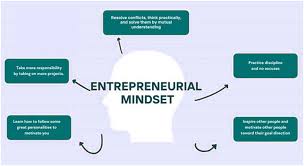The Entrepreneurial Mindset: Thinking Big, Achieving More
Executive Summary
The entrepreneurial mindset is a unique blend of creativity, innovation, and risk-taking that drives individuals to start and grow successful businesses. This white paper delves into the key characteristics of entrepreneurial thinking, explores successful case studies, and provides valuable insights from renowned books and research. By understanding the principles and strategies outlined in this paper, aspiring entrepreneurs can cultivate the mindset necessary to achieve their goals.
Understanding the Entrepreneurial Mindset
The entrepreneurial mindset is a complex interplay of cognitive, emotional, and behavioral factors. Key characteristics include:
- Innovation: The ability to generate new ideas and solutions.
- Risk-Taking: The willingness to take calculated risks.
- Resilience: The capacity to bounce back from setbacks.
- Self-Efficacy: The belief in one's ability to succeed.
- Adaptability: The flexibility to adjust to changing circumstances.
- Passion: A strong drive and enthusiasm for one's venture.
Cultivating the Entrepreneurial Mindset
To cultivate an entrepreneurial mindset, consider the following strategies:
- Embrace a Growth Mindset:
- Believe in your ability to learn and grow.
- View challenges as opportunities for improvement.
- Embrace a lifelong learning approach.
- Develop Critical Thinking Skills:
- Question assumptions and conventional wisdom.
- Analyze information from multiple perspectives.
- Think creatively and generate innovative solutions.
- Practice Effective Problem-Solving:
- Break down complex problems into smaller, manageable steps.
- Explore multiple solutions and evaluate their potential outcomes.
- Learn from failures and use them as opportunities to grow.
- Build Strong Relationships:
- Network with other entrepreneurs, mentors, and industry experts.
- Collaborate with others to achieve shared goals.
- Cultivate a positive and supportive network.
Case Studies: Real-World Examples of Entrepreneurial Success
- Elon Musk: A visionary entrepreneur who has revolutionized industries such as electric vehicles, space exploration, and clean energy.
- Oprah Winfrey: A media mogul who built a global empire through hard work, resilience, and a strong personal brand.
- Steve Jobs: A technological pioneer who transformed the way we communicate, work, and entertain.
Key Books to Inspire Entrepreneurial Thinking
- "Think and Grow Rich" by Napoleon Hill: A timeless classic that explores the power of positive thinking and goal setting.
- "The Lean Startup" by Eric Ries: A practical guide to building successful startups through iterative development and customer feedback.
- "The 7 Habits of Highly Effective People" by Stephen Covey: A comprehensive framework for personal and professional success.
- "The Power of Positive Thinking" by Norman Vincent Peale: A motivational book that emphasizes the importance of optimism and a positive mindset.
Research and References
Numerous academic studies and research papers have explored the entrepreneurial mindset. Here are some key references:
- Bandura, A. (1977). Self-efficacy: Toward a unifying theory of behavioral change.
- McClelland, D. C. (1961). The achieving society.
- Shane, S., & Venkataraman, S. (2000). The promise of entrepreneurship as a field of research.
Conclusion
By cultivating an entrepreneurial mindset, individuals can unlock their full potential and achieve extraordinary things. By embracing innovation, risk-taking, resilience, and a growth mindset, aspiring entrepreneurs can overcome challenges, seize opportunities, and build successful businesses.
Remember, the journey of entrepreneurship is not always easy, but the rewards can be immense.
Would you like to delve deeper into a specific aspect of the entrepreneurial mindset, such as innovation, risk-taking, or leadership?



